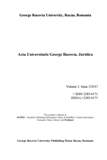The most important challenges of Romania for the sustainable development of the freedom, security and justice space in the European Union
The most important challenges of Romania for the sustainable development of the freedom, security and justice space in the European Union
Author(s): Nelu Niţă, Marius Ciprian BogeaSubject(s): Law, Constitution, Jurisprudence
Published by: Editura Universităţii George Bacovia din Bacău România
Keywords: area of freedom; security and justice; knowledge-based economy; mutual trust; exchange of experiences; best practices
Summary/Abstract: In a European area of security, freedom and justice, all citizens have the right to move freely, anytime and anywhere within the European Union and to choose the place where they work or live, without any restriction regarding nationality. They shall enjoy protection against organized crime at an international level and also enjoy equal access to justice and fundamental rights, wherever they may be in any of the European Union member states. According to Security Strategy, Romania must strengthen the security model, based on EU principles and values, namely: human rights and fundamental freedoms, rule of law, democracy, dialogue, tolerance, transparency and solidarity. It is recognized that "zero risk" does not exist, but despite this, Romania, like all EU countries, must create a safe environment where all people feel protected. More than that, the necessary mechanisms should be established to maintain a high level of security, not only in Romania and the European Union, but also, to an extent when citizens travel to third countries, or when they are in virtual environments, such as the Internet. It is vital for Romania that the Internal Security Strategy of the European Union, can adapt to the needs of their citizens and the challenges inherent, dynamic and global of the XXI century. In the context of Europe's Internal Security Strategy, Romania should effectively exploit potential synergies related to European and international cooperation in law enforcement, integrated border management and mutual consolidating criminal justice systems. In fact, these areas of activity within the European area of justice, freedom and security are inseparable, so that the Internal Security Strategy of the European Union should ensure that they complement and reinforce each other. Current evolution of the European Union as a whole and each country, takes place in the implementation of the Lisbon Strategy, which sets out, landmarks and essential ways for the construction of the new economy, that of the knowledge economy. Human dignity, freedom, democracy, equality and the rule of law are core values of the European Union, set in the first few pages of the Treaty of Lisbon. These values must be common to all Member States and any European countries that wish to join the Union must respect them. Promoting these values, along with peace and welfare of EU citizens, is now the main objective of the European Union. These general objective is underpinned by a series of specific objectives such as promoting social justice and protection and the fight against exclusion and discrimination. Achieving these objectives requires, for all professionals, multiplying the exchange of experiences and best practices, especially on ethical as well as training and joint exercises.
Journal: Acta Universitatis George Bacovia. Juridica
- Issue Year: II/2013
- Issue No: 2
- Page Range: 325-358
- Page Count: 34
- Language: English

